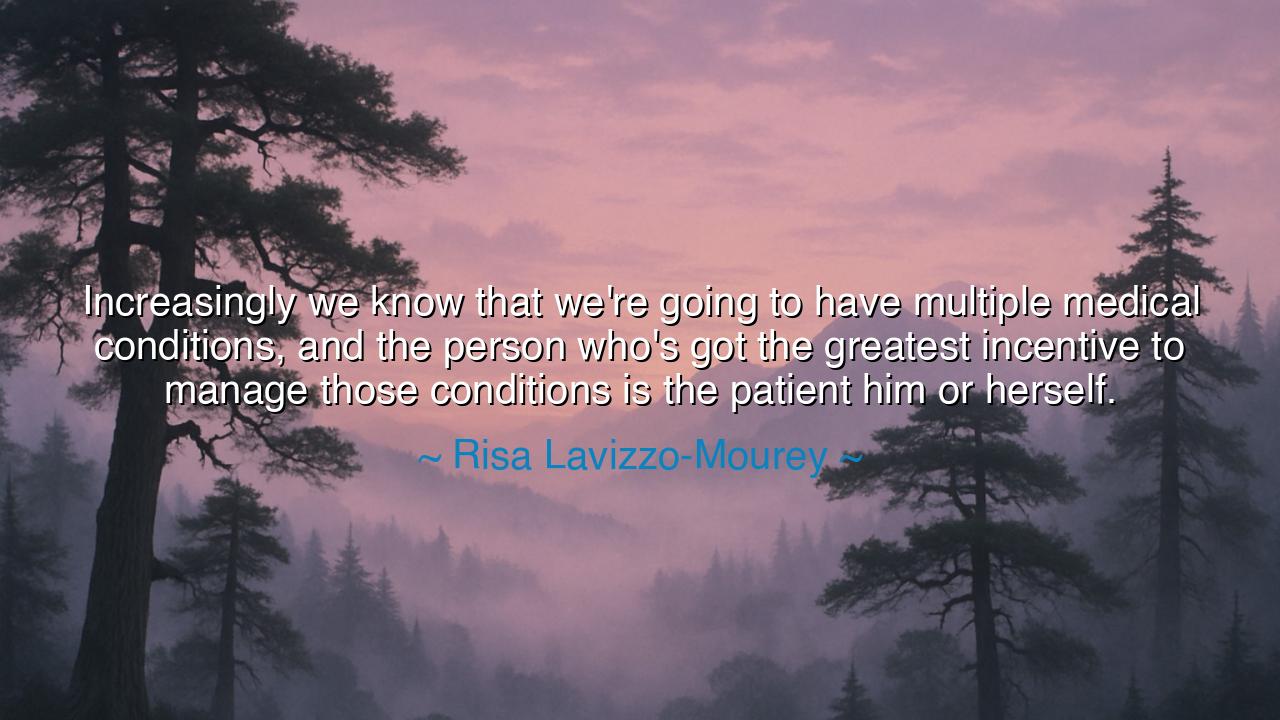
Increasingly we know that we're going to have multiple medical
Increasingly we know that we're going to have multiple medical conditions, and the person who's got the greatest incentive to manage those conditions is the patient him or herself.






The words of Risa Lavizzo-Mourey—“Increasingly we know that we're going to have multiple medical conditions, and the person who's got the greatest incentive to manage those conditions is the patient him or herself”—speak not merely of medicine, but of human destiny. In the ancient rhythm of life, each man and woman was the steward of their own vessel. The healer could guide, the herbalist could soothe, but the flame of endurance—the will to continue, to heal, to manage the storms within—belonged to the patient alone. Risa’s words awaken that same eternal truth: that responsibility for one’s own health is both a burden and a liberation, a sacred duty woven into the fabric of living itself.
In her insight, we hear an echo of the old physicians of Greece—Hippocrates, who believed that the best doctor lives within the patient, for no cure can take root without the desire to be whole. The modern world, with its countless pills and machines, often forgets this. Yet as life lengthens, so too does the list of ailments we must carry. High blood pressure, diabetes, heart disease—they are the new companions of age. And though science has made wondrous progress, no invention can replace the daily decisions that sustain a body: what we eat, how we rest, how we forgive, how we move. Self-management becomes not just a medical act, but a moral one.
There is a story from Japan, of a man named Morio, who suffered from both arthritis and heart disease. The doctors told him his body would betray him in time, that no medicine could hold back both tides. But Morio took charge of his own fate. He rose early, walked through the misty hills, learned the calm art of breathing, and transformed his meals into rituals of care. Years later, when he returned to his physicians, they were astonished—the diseases had quieted. “I did not heal myself,” he said, “I merely became my own guardian.” This story mirrors Lavizzo-Mourey’s wisdom: the patient who takes command of his journey wields the greatest power of all.
There is something profoundly human about this truth. For in illness, the illusion of control dissolves, and we meet ourselves as we are—fragile, fearful, and yet filled with potential. The doctor can diagnose, the nurse can comfort, but only the patient can choose courage over despair, discipline over surrender. The act of managing one’s conditions becomes a meditation on life itself. It is to look into the mirror each morning and say, “Though I am imperfect, I am still the keeper of this body, the steward of this soul.”
The ancients taught that strength is not found in the absence of weakness, but in the will to face it with awareness. Risa’s words remind us that in the age of chronic disease, wisdom must replace denial. To be a patient is no longer to wait passively for healing—it is to participate in one’s own salvation. The old paradigm of healer and healed must evolve into partnership, where knowledge is shared, and responsibility embraced. This is the medicine of the new world: empowerment over dependence, understanding over obedience.
Consider the lesson of Franklin Roosevelt, stricken with paralysis in his prime. His physicians could not restore his legs, but he refused to surrender his life to infirmity. Through years of self-directed therapy and relentless spirit, he not only walked with braces but led a nation through despair. His recovery was not of the body alone—it was of the will. His example proves that when the patient becomes the master of his own destiny, even great limitation can give rise to greatness.
The lesson of Risa Lavizzo-Mourey’s quote is thus timeless: we are all, in one way or another, patients—guardians of fragile vessels destined to weather storms. We may not control the diseases we inherit, but we can control the choices that shape our response. To future generations, this truth must be passed down: care for yourself as though you were both the doctor and the disciple. Let every act of discipline be a form of devotion. Let every act of awareness be a kind of prayer.
And so, dear listener, remember: health is not given; it is cultivated. The patient who accepts this role steps into the ancient lineage of those who refuse to be victims of their fate. Rise each day as your own healer. Learn, act, and endure. For the body, though frail, obeys the will—and the spirit that takes ownership of its healing will find not only strength, but meaning in every breath it preserves.






AAdministratorAdministrator
Welcome, honored guests. Please leave a comment, we will respond soon